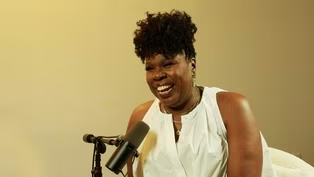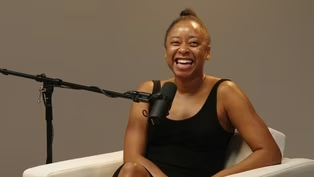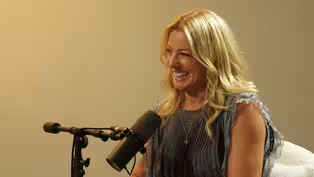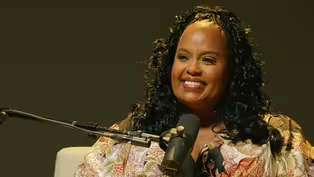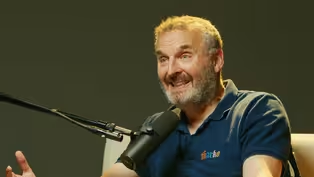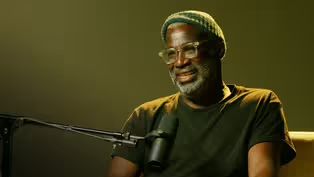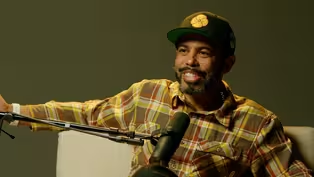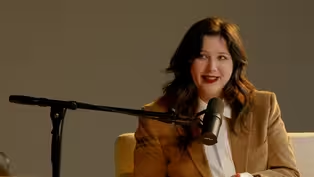
Daniel Dae Kim Leads Spy Drama and Fights for Industry Change
Special | 21m 48sVideo has Closed Captions
Actor Daniel Dae Kim on his groundbreaking career and new project, "Butterfly."
In this episode, Daniel Dae Kim reflects on his upbringing and how an early fascination with American pop culture became the foundation for a career in the arts. He explores television’s power to foster empathy across cultural divides, shares the story behind developing Butterfly, and opens up a new dialogue on the issue of ethnic-specific casting.
Problems playing video? | Closed Captioning Feedback
Problems playing video? | Closed Captioning Feedback
Support for American Masters is provided by the Corporation for Public Broadcasting, AARP, Rosalind P. Walter Foundation, Judith and Burton Resnick, Blanche and Hayward Cirker Charitable Lead Annuity Trust, Koo...

Daniel Dae Kim Leads Spy Drama and Fights for Industry Change
Special | 21m 48sVideo has Closed Captions
In this episode, Daniel Dae Kim reflects on his upbringing and how an early fascination with American pop culture became the foundation for a career in the arts. He explores television’s power to foster empathy across cultural divides, shares the story behind developing Butterfly, and opens up a new dialogue on the issue of ethnic-specific casting.
Problems playing video? | Closed Captioning Feedback
How to Watch American Masters
American Masters is available to stream on pbs.org and the free PBS App, available on iPhone, Apple TV, Android TV, Android smartphones, Amazon Fire TV, Amazon Fire Tablet, Roku, Samsung Smart TV, and Vizio.
Buy Now
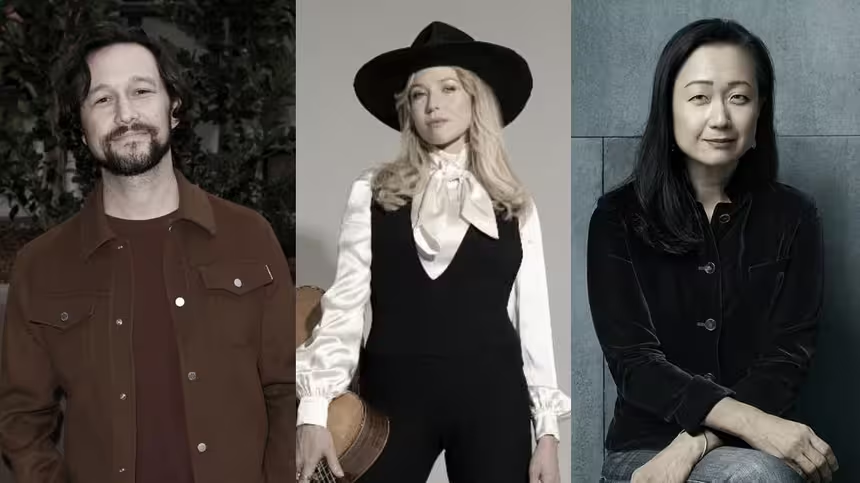
A front row seat to the creative process
How do today’s masters create their art? Each episode an artist reveals how they brought their creative work to life. Hear from artists across disciplines, like actor Joseph Gordon-Levitt, singer-songwriter Jewel, author Min Jin Lee, and more on our podcast "American Masters: Creative Spark."Providing Support for PBS.org
Learn Moreabout PBS online sponsorshipMore from This Collection
How do today’s masters create their art? "Creative Spark" presents narrative interviews that go in-depth with an iconic artist about the creation of a single work. Each episode offers a unique window into the world of art and the creative process of artists and cultural icons across a wide range of disciplines, from music and comedy to poetry and film.
How Leslie Jones Became a Comedian
Video has Closed Captions
Comedian and actress Leslie Jones does a deep dive on her creative process. (31m)
Phoebe Robinson Shows Her Work
Video has Closed Captions
Comedian Phoebe Robinson takes on hustle-culture in biting comedy special. (31m 45s)
Sarah McLachlan: Making Music to Connect and Heal
Video has Closed Captions
Singer-songwriter Sarah McLachlan opens up in a candid interview about making music. (37m 19s)
How Natasha Rothwell’s Life Brought Her to “The White Lotus”
Video has Closed Captions
Actress Natasha Rothwell on her creative process in "The White Lotus." (33m 40s)
Phil Rosenthal’s Secret Recipe: Good Food and a Laugh
Video has Closed Captions
TV writer and host Phil Rosenthal talks about finding our shared humanity in food and comedy. (22m 53s)
Tunde Adebimpe Channels His DIY Roots Into Raw Solo Debut
Video has Closed Captions
Musician Tunde Adebimpe on his creative process behind his solo album debut. (37m 28s)
Daveed Diggs Takes on Cyberpunk Rap
Video has Closed Captions
Rapper and actor Daveed Diggs on his creative process as a rapper and songwriter. (25m 28s)
Lucy Dacus Makes Her First Loves Songs
Video has Closed Captions
Singer-songwriter Lucy Dacus talks about love songs for her new album, "Forever is a Feeling." (23m 49s)
Providing Support for PBS.org
Learn Moreabout PBS online sponsorship- Ultimately, what do you hope that your impact will be on culture as a producer and as an actor?
- That somehow the work that I do as an actor and as a producer, help to create understanding among people, help bring people together, and encourage this idea of a global community.
(upbeat music) - I'm Joe Skinner, this is American Masters Creative Spark, and that was Daniel Dae Kim, an actor who you've probably seen in shows like "Lost," and "Hawaii Five-O" and "Avatar, the Last Airbender."
Or movies like "Joyride" or "K-Pop Demon Hunters."
Now he's executive producer and star of the new TV series called "Butterfly" on Prime Video.
He's also fresh off being named to Time Magazine's, Top 100 Most Influential People List.
Let's see how he got here.
What was the thing that first got you really excited to act in your life?
- I used to watch a lot of television growing up.
I was really into pop culture.
In fact, when I was in second grade, I won a radio contest because the radio DJ had a trivia like question, and trivia show, and they asked the question, "Who is this 1950s blonde sex symbol?"
And I, you know, back in the day, you could call the number.
I called in and I said, "Is it Marilyn Monroe?"
And the DJ said, "Will you put your dad on the phone?"
And I said, "My dad's not here, he's working."
He said, "Well, who gave you that answer?"
I said, "I just knew it."
And he didn't believe me, and he kept thinking that an adult had, you know, told me the answer because Marilyn Monroe was alive like 40 years before I was ever born, you know?
But that was the degree to which I was, I just immersed myself in American pop culture.
So I was watching a lot of movies like the "Breakfast Club" growing up and "Sound of Music," and I just thought to myself, like, to be a part of storytelling, about who we are and, you know, who we could be was really fascinating.
And my dad was a doctor and so, just thinking about an alternative profession to what he was doing seemed taboo at the time.
And so I never really gave it much thought until I got older and I started to really kind of assert my own will and follow my passion.
- You were growing up in Pennsylvania, right?
- Yeah, New York and Pennsylvania.
So I grew up in, you know, a steel town area in Pennsylvania, the Lehigh Valley.
And so, you know, there weren't many people who looked like me, and it kind of defined my experience growing up.
And I think, you know, being in a place where there were a lot of questions about someone who looked like me, and a lot of prejudgments, I think it gave me in some way a need for expression, a need to show people what I could do.
And I think that manifested itself in the performing arts.
- And did you find yourself going to New York a lot, New York City to go see shows?
- I didn't go into New York much for theater.
It wasn't really part of my family's kind of vocabulary for entertainment, you know.
You know, I was born in Korea, and so we lived a very immigrant lifestyle.
We went, the times we were going to New York from Pennsylvania was to stock up on Korean groceries, because there were none in my area at the time.
So we'd take trips into New York to go to Korean restaurants and go to Korean groceries, but theater going was not part of the itinerary.
(Joe chuckling) - How did you first get involved with theater?
- You know, some of my friends in high school started doing theater, and there was one particular friend who wanted to recruit me to do a play.
And so that was kind of how I got around the theater kids, but it wasn't really until college that I started doing theater in earnest.
- And then you find your way over to New York for graduate school, right, for theater?
- Well, when I graduated from college, I came into New York and did primarily stage.
I worked at places like Pan-Asian Rep and NAATCO, these were Asian-American focused theaters, which I consider an invaluable part of my career because I really wouldn't have worked otherwise.
And I got to work on classical plays, and it kind of ignited a little fire in me to kind of keep pursuing this idea of classical theater.
And so, that's when I decided to go to NYU to the Master's Program there to get my degree in theater.
So it gave me a methodology for my work, and that is not to be confused with the method, although I think there are certain things in the method that I do use.
And the thing I learned at NYU is that not every one method works the same way for every actor.
There are several ways into how to unlock the ability to do your best work.
Sometimes it's an external thing, like a costume.
And that's what I'm feeling right now in "Avatar the Last Airbender" the costume is so ornate that as soon as I put it on, it changes my posture, it changes my gait, and it automatically clicks me into a character.
But sometimes it's a line in script that I just connect to in a way, and that's my way into a character.
But what NYU did was give me a, as I said, a set of tools to say, use the right tool for the right occasion.
You don't have to follow this one dogmatic idea of what an actor's process is.
And so, I'm able to pull from all the things that I learned at NYU and use them specifically for certain different roles.
- A lot of people know you for your TV work.
When did TV kind of first come into the picture?
- After I graduated, I did theater here for a little while, and that's when my wife and I had our first child.
And I'll never forget, I was working at the public theater on a show, and I was so honored to be coming out of school and to be working at a place as prestigious as the public.
And I got my first paycheck, and I was holding my son in my arms, who was just an infant, and I looked at the paycheck and I looked at my son, I looked at the paycheck again, and I said to my wife, "I think we have to move to LA and do TV," because I can't afford to raise this little boy with this amount on my paycheck.
And that was when we decided to make the move.
- Daniel Dae Kim bounced around as a day player on a lot of different projects, earning his keep on TV shows, like "NYPD Blue" "CSI," and "Star Trek Voyager."
And it wasn't until his main role in 2004s "Lost" that he really broke through with the character, Jin.
He's kept a prolific output, recently receiving a Tony Nomination for Lead Actor in the Broadway play "Yellow Face," a show that he worked on right after completing production on "Butterfly," which is an international spy thriller action series where he plays a former US spy living in South Korea.
To an outsider, the two projects couldn't be more different from each other.
- To me, they didn't seem that different.
They were just different expressions of what I enjoy doing.
The core of both projects, in terms of my work as an actor, is exactly the same.
You know, I approached "Butterfly" from a character viewpoint first, and the action was a manifestation of the character's intentions and conflicts, and the need to overcome his obstacles.
And that's when action makes sense to me.
Action doesn't make sense to me when I can tell, I'm reading a script and I can tell the dialogue is just an excuse to get to another fight.
But I think, in my humble opinion, "Butterfly" is an interesting examination of character, even though it's set in the action adventure spy genre, at its heart, it's a relationship drama.
You can't keep living this life.
(upbeat music) (gun fire booming) At some point you start to lose yourself.
(upbeat music) That's why I came back for you.
- Dad?
- What drew you to the graphic novel, and I know you're an executive producer on it too, so you were probably deeply involved with that early development process, right?
- I was.
You know, I was introduced to the graphic novel by the head of the comic book company, "Boom."
And the original is set in the US and Europe with white Americans.
And, you know, I looked at it and thought, wow, this is a really intriguing story, but if you're gonna have someone who looks like me, I wonder if they'd be open to changing the characters to Asian-American, and change the setting to the US and Asia.
And to their credit, both the writer and the head of the studio said, "Yeah, let's do it."
And so, we started redeveloping the project through that lens, and that's how a lot of the themes, a lot of the ideas, and of course the setting, being Korea came about.
All these years.
I questioned myself, as an agent, as a father, but soon we can stop running.
I've waited a long time to finish this together as a... - As a family.
- I'm so happy I'm alive and in this business to be here for this kind of a moment, you know.
There's been a slow and steady, well, I wouldn't even characterize it in steady, it's been a big wave of Korean awareness, awareness of Korean culture, K-pop, K-drama, K-beauty, K-food now.
And so, it's nice to be a small part of bringing awareness to a culture that I love so much.
One of the most special things about "Butterfly" is that it integrates the two biggest parts of who I am as an American and a Korean.
And to be able to tell a story that speaks authentically to my lived experience is something that I haven't seen on television before in this way.
So I'm really honored to be able to do that, and in a way that doesn't really call attention to, oh, look at how difficult it is to be Korean-American or an Asian-American.
It's really, it's.
My character and the characters that are in the series our ethnicities are in service of the act, the story and the plot and the idea in general.
And I think that's important because our first job is to entertain above all.
And if I can introduce people to a new culture and you know, as a consequence create understanding between people, then that's, that's an incredible bonus.
That's something we get to do as storytellers.
And I think right now, at a time in our culture where things are so divisive and people are scapegoated, especially if they don't look like you, that's a message that I'm fully in support of telling.
- And in television especially, you get to really spend time with characters to see that journey.
I mean, I think of with your character in "Lost" too, you're spending years with a character to see them transform.
- That is something that the medium of television offers that no other medium does.
On stage, you live with these characters for a few hours, and maybe if it's like a trilogy or something like Harry Potter or Angels in America, it's six hours.
But, you know, and in a movie, you know, you have two and a half hours or whatever, unless there are sequels, and that kind of thing, but on TV to start the arc of a character and continue it over a hundred episodes, a hundred hours is something unique.
And it's only because of that medium that I think my character, Jin, was able to grow the way he did.
Because I would say that in the pilot, not many people liked him.
And if he were to have died in the pilot, people wouldn't have been sad.
But if he, you know, when he ended up meeting his fate in season six, by that time, there was a whole different perspective on not just him, but the idea of who Koreans are, and the relationship, the fact that the relationship was between two Koreans was, in some ways the heart of the show, said such a nice thing about how effectively that story was told, and what the American public was ready for.
Not just the American public, but "Lost" was a global show.
So audiences around the world embraced this Korean couple who, one of whom did not speak any English.
And that was, I think, a first on American TV.
- Yeah, I mean, I think people really take it for granted now, because there has been so much progress in that direction.
But, you know, I was fairly young when "Lost" first came out, and you know, for me, even growing up in New Jersey in a small town, I wasn't exposed to Korean communities at all, for example.
So seeing a character like that on "Lost," it was a big learning moment for me.
- And it makes me just think about how many other communities there are out there that have yet to take their place in the spotlight.
And these are the stories I'm interested in telling as a producer, you know, who are the people whose, who we haven't heard from yet, the way that for a long time we hadn't heard from Asian-Americans.
You know, we still have a ways to go, and it's, I think that's the beauty of what we can do as storytellers and entertainers.
We can constantly be challenging the status quo.
We can constantly be introducing people to something new, someone new.
And our definition of hero can be transformative.
- You've mentioned in another interview, you've talked about ethnic specific casting, and I didn't quite hear the answer on that interview, so I'm really curious, you know, what's your approach to ethnic specific casting?
- Wow, I'm really glad you asked that question, because it's something I've thought a lot about, and obviously I've lived through a lot.
Right now there's a focus on nationality specific casting when it comes to Asian-Americans, that I feel is an overcorrection.
You know, very often when we're cast, if the roll calls for a Korean-American, they will not see a Japanese-American, or a Chinese-American or any other Asian nationality.
But there are very oftentimes when the role itself has not been thought through, that it doesn't require any kind of specificity in the story as it's being told, or in the specifics of the character, 'cause very often it's not even written by an Asian person.
So they don't know the difference in what they're asking for, and yet casting is being very specific.
I think there are times when nationality specific casting is important.
For instance, when there's an authentic language requirement in the role, or it's based on someone who's a real person, that has cultural significance to that particular country.
And in those cases, I really feel like we need to be specific.
But oftentimes, we're being cast as roles specifically when the characters themselves are fictitious and they don't even exist in real life, and they weren't written by, again, Asian people.
So anytime there's a role that focuses, to me, on the American experience of being Asian, that's something that no matter whether you're Korean, Chinese, Indian, you know, Malaysian, that's something we all share in common as Asian-Americans.
And we all know what it feels like to be othered.
That's a common experience.
And so to me, the nationality isn't as important.
So I'd like to see us take the next step in the way we think about ethnic specific casting.
And I believe it started from a good place, because originally it was like, well, you know, we can't just consider them all as one.
That's true, but we need to be a little bit more sophisticated now about how we can open opportunities to actors.
It's why Reina Hardesty is cast as my daughter in "Butterfly."
She's not Korean-American, she's Japanese-American, and she's mixed race Japanese-American.
That was a deliberate choice on my part, because what the significant part of her character was is the idea of feeling alienated and alone in America.
You don't have to be Korean-American to feel that way.
And I also made a specific choice about who her mother was and that David, David's ex-wife is Caucasian.
And that was a deliberate choice because that's part of the American experience that I actually want to explore, and continue to kind of scratch the surface of, because we haven't seen that either.
So there are degrees to a lot of this, but I think it's a nuanced conversation that I'd like to really have a dialogue about.
Asian-American actors are often specified by nationality when other ethnicities are not.
When African-American actors are hired, very rarely are they asked, you know, where is their country of ancestry?
Whether you're Botswanan or, you know, from the Ivory Coast.
It's not pertinent, especially if you're playing an American.
And how many of our superheroes who are playing American are from other countries like Australia and England, and yet we don't ever ask whether that's important, relevant, and it doesn't limit them from taking those roles.
In fact, we welcome them.
So, you know, it's an interesting standard that I'd like to see thought through a little bit more.
- It feels like, you know, when you're in that kind of creative leadership position, you can really impact not just the story, but an industry in that way.
- I mean, these are you the, you touched on it earlier, like if you're in a position to create jobs or make decisions, you know, it's an opportunity to change some things that you've seen that you haven't necessarily agreed with.
And at the very least, open up a dialogue about where we go next, because these things are never static.
- Last question.
What do you hope people take away from "Butterfly?"
- I would love for them to see Korea and say, "Wow, what an amazing country."
We shot in over 20 different cities all throughout South Korea.
I went to places that I'd never been in Korea, and I'd been going back since I was a little boy.
I'd love for them to see that.
I'd love for them to look at the relationship between a father and daughter and see the relatability and the universality of that relationship with people who look like me and say, "Wow, I never thought I would be seeing my relationship with my own father or my own kid through these folks."
And, you know, at the same time, get a little action.
You know, if you're, you know, one of those action junkies to get your fill.
Because very often these kinds of shows, it's either one or the other, but I love the fact that we have both.
But above all, I want people to be entertained, and just say, "That was a good way to spend my time."
- Great.
Well, thanks so much for coming in.
- My pleasure.
- [Joe] That's our show.
A big thank you to Daniel Dae Kim for taking the time to talk.
Just a reminder that you can watch this episode and more on our channel on YouTube at youtube.com/americanmasters.
Subscribe while you're there for more from American Masters.
Creative Spark is a production of the WNET Group, media made possible by all of you.
This episode was produced by me, Joe Skinner.
Our executive producer is Michael Kanter.
Original music is composed by Hannis Brown.
This episode was mixed and mastered by Evan Joseph.
Funding for American Masters Creative Spark is provided by the Rosalind P. Walter Foundation, the Anderson Family Charitable Fund, the Mark Haas Foundation, Sue and Edgar Wachenheim III, the Charina Endowment Fund, the Ambrose Monell Foundation, the Kate W. Cassidy Foundation, and the Philip and Janice Levin Foundation.
(gentle music)
Support for PBS provided by:
Support for American Masters is provided by the Corporation for Public Broadcasting, AARP, Rosalind P. Walter Foundation, Judith and Burton Resnick, Blanche and Hayward Cirker Charitable Lead Annuity Trust, Koo...

